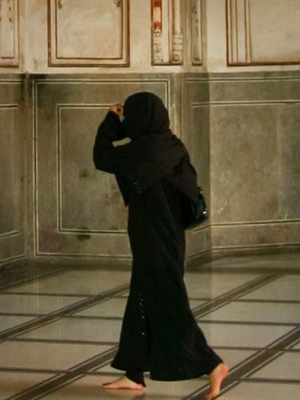
Photo by Hassan Wasim
By Asif Shahzad
The Associated Press
THATHA PIRA, Pakistan (AP) — After six years of abuse, Allah Rakhi was walking out of her marriage when her husband struck again. Snatching a knife, he sliced off her nose. “You’re no longer beautiful!” he shouted.
He then slashed at her foot — brutal punishment for leaving the house without his permission.
“A woman is only a woman inside the home. Outside. she’s a whore!” he yelled at Rakhi, as she lay bleeding on the dusty street just outside her home.
That was 32 years ago.
All that time, Rakhi hid her disfigured face under a veil. Then in March, a surgeon took up her case. He cut flesh from her ribs and fashioned it into a new nose, transforming her life.
While the details of every case of violence against Pakistani woman differ, many are based on a concept of “family honor.”
Women can be targeted for suspicion of an affair, wishing to divorce, or dressing inappropriately. Hundreds of women are murdered each year because of mere suspicions.
The nose is considered the symbol of family honor in Pakistan — explaining why a woman’s nose is often the target of spousal abuse. A popular plea from parents to children is, “Please take care of our nose,” which means, “don’t do anything that tarnishes the reputation of the family.”
Rooted in tribal ideas that a woman’s chastity is the property of the man, honor killings are practiced in much of the Arab world and South Asia. They have also been carried out by immigrants from those regions to the West.
Pakistani courts have a history of letting off offenders or giving them only light punishment, assuming the cases get to trial at all.
Rakhi’s husband, for example, served just 10 months in jail before being released in exchange for a commitment to pay her medical bills. He never did.
Accurate statistics on the extent of honor crimes are hard to come by, because many cases go unreported or are settled out of court under pressure from the families of the victim and the attacker.
The Human Rights Commission of Pakistan said that in 2011, at least 943 women were murdered, nine had their noses cut off, 98 were tortured, 47 set on fire, and 38 attacked with acid.
Efforts to introduce stronger laws to increase punishments for violence against women have been blocked by an Islamist political party that publicly supports the Taliban in neighboring Afghanistan. The party, Jamiat Ulema Islam, is a member of the ruling coalition.
The lower houses of parliament passed the bill, but the JUI is preventing its passage through the upper house.
“We will never let it happen,” said JUI senator Maulana Ghafoor Haideri, who said the bill was an attempt to “Westernize” Pakistan. “It will ruin our family institutions,” he said.
Shad Begum, a Pakistani rights activist who received the U.S. International Woman of Courage award from first lady Michelle Obama this year, said firmer laws and better enforcement are the only solution to violence against woman.
“Our leaders need to take a firm stand,” she said. “If a man makes a woman a victim, or makes an ‘example out of her’ as he believes, our courts should also make an example out of him.”
Rakhi was attacked when she was 19, after being married at 13. Despite it being illegal, child marriages remain common in parts of Pakistan.
Following the attack, she worked to support herself and her daughter, painting flowers on pots in a factory and buying and selling clothes in markets across the country, all the time hidden behind a veil.
“I died every moment,” Rakhi said in her three-room mud and brick house in a village hidden among the wheat fields of Pakistan’s Punjab province.
Rakhi’s husband divorced her soon after he was released from prison, she said.
In a bizarre twist, the 51-year-old woman now lives again under the same roof as him — something she claims as a “victory,” but also perhaps points to her poverty and lack of alternatives.
Rakhi’s son persuaded her to return home, anxious for her to have a more comfortable life.
On a recent visit, the husband scooted out of the house as Rakhi welcomed a reporter, and he did not make himself available for comment.
She said she never stopped hoping for a new nose, but doctors were unwilling to operate because she suffers from hepatitis C, a liver condition that can complicate surgery.
It was her daughter who gave her the chance. She was working in the capital, Islamabad, at an institute that provides training for woman recovering from having acid thrown on their faces. She introduced Rakhi to the Acid Survivors Foundation, which put her in touch with a surgeon.
Dr. Hamid Hasan took her case for free. Asked why he would take the chance, he answered, “Her pleas. Her tears.”
At a follow-up appointment last month, Hasan touched the scars, where the stitches once were on her nose and forehead.
Rakhi winced slightly, and smiled as the surgeon took his hands away.
Hasan said her positive attitude was important for the other operations she must undergo in the coming months.
“Thank God I did not commit suicide,” Rakhi said. “Life is a blessing!” (end)


